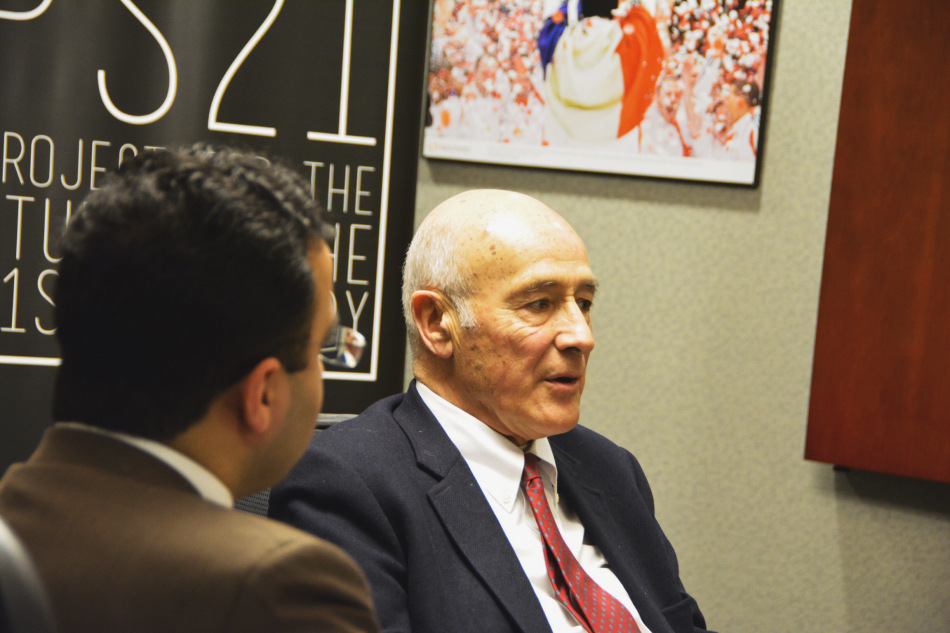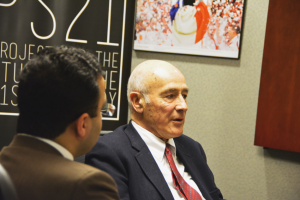Photo credit: Project for the Study of the 21st Century
By Ali Wyne, MPP 2017
I grew up in the golden 90s. The U.S. economy was booming, threats of war and terrorism seemed distant, and I was blissfully aloof of developments abroad. I loved to do math and hated to read; the more my parents implored me to crack a book slightly more advanced than Frog and Toad Are Friends, the more I played with the calculator they had given me as a birthday gift when I was a kid. I had every intention of studying math in college and pursuing a career as a mathematician—that is, until 9/11 happened, early in my junior year of high school. Beyond compelling me to appreciate how sheltered I had been, the events of that day prompted me to question my chosen path—a recalibration that accelerated amid the ensuing debate over whether or not to invade Iraq.
Following in my sister’s footsteps, I took a year off after graduating from high school. I didn’t have any concrete objectives—just an abstract goal of becoming worldlier. My folks and I traveled to Pakistan, where my parents were born. I interned with Amnesty International for a few months. I tried to read the newspaper on a regular basis. Most importantly, though, I stumbled across a 2002 book by Joseph Nye, The Paradox of American Power: Why the World’s Only Superpower Can’t Go It Alone. It was at once exceptionally sophisticated and highly accessible; even someone such as myself, with virtually no grounding in world affairs, could get a sense of its big ideas. He argued that, despite its surpassing military, economic, and political influence, the United States couldn’t sustain a liberal world order or lead the way in addressing major global challenges—whether climate change or nuclear proliferation—without enduring, robust multilateral cooperation.
In early 2004, shortly after finishing his book, I e-mailed Professor Nye—then dean of the Harvard Kennedy School—to say that it had stimulated my interest in world affairs, sufficiently so that I had decided to switch majors to political science. I don’t have a copy of the note, but I recall thinking shortly after I had sent it that it probably came off a bit overzealous. I wasn’t too concerned, though, since I wasn’t expecting an answer; I doubted that someone in his position would have either the time or the desire to answer fan mail.
To my surprise, though, he did reply, saying he’d be happy to meet if I happened to be in town. I set up an appointment with him and flew to Boston shortly thereafter. I was nervous when I walked into his office, not only because I didn’t know what to say (beyond repeating that I had learned a lot from his book), but also because I recognized his stature: Professor Nye is a Rhodes Scholar, a former chairman of the U.S. National Intelligence Council, and someone whom policymakers and academics alike consistently rank as one of the most influential scholars of international relations over the past half century. But he immediately put me at ease. He asked me about my childhood and my family, encouraged me to cultivate my newfound interest in political science, and told me to keep him posted on my plans.
I’ve stayed in touch with him regularly since we met that day. When he published Soft Power: The Means to Success in World Politics in 2004, I mailed him a letter with some reactions. He not only acknowledged it but also took the time to reply to my critiques. I started sending him article ideas and drafts soon thereafter—something I do to this day. Professor Nye has never led me astray with vacuous words of encouragement (which folks will sometimes do if they don’t want to be bothered further by someone whose insights they find wanting). Nor has he ever discouraged me by contending that my arguments are wholly without merit. Instead, he has given me constructive criticism, highlighting erroneous assumptions I’ve made and important nuances I’ve neglected, but still giving me the confidence to believe that I can contribute to the marketplace of ideas. He’s one of the first people whose judgments I consult when I’m trying to understand high-level strategic trends and make sense of America’s role in an increasingly chaotic, disorderly world, and one of the first people whose reactions I try to anticipate when I write something.
Professor Nye has not only been a mentor for over a decade; he has also given me many opportunities along the way. In mid-2011, for example, the Washington Journal of Modern China approached him about writing a piece; he didn’t have the bandwidth to do so, so he told the editor to consider letting me draft it. He shared excerpts from his three most recent books—The Future of Power (2011), Presidential Leadership and the Creation of the American Era (2013), and Is the American Century Over? (2015)—and said he’d be open to my comments. Most recently, I had the privilege of serving as a course assistant for his module on the ethics and leadership of postwar U.S. presidents.
Since I first met Professor Nye, he has invariably spoken with a quietness and humility that belie his stature as a towering figure in international relations. Daniel Drezner contends that “[a]ll roads to understanding American foreign policy run through Joe Nye.” John Ikenberry calls him “the preeminent theorist of power in world affairs today.” And, in his review of The Future of Power, Ian Morris describes Professor Nye as “a master of his field at the height of his powers.”
Out of respect, I continued addressing him as Dean Nye long after he had stepped down as head of the Kennedy School. Early this past November, after meeting him to brainstorm what I might do after I graduate, he told me that I should feel free to come to him for advice whenever I found myself at a fork in the road. As I left his office, he said: “Call me Joe.” I replied that it’d take me a while to get accustomed to doing so, but I’d try.
So, Joe, on your last day of teaching: thank you for answering that random e-mail I sent you 13 years ago. Thank you for investing in me. And thank you for teaching me anew each day how to be a more rigorous thinker and a more generous person. As with the countless others you’ve mentored over the decades, I can’t repay the debt I owe you. I promise, though, to do my utmost to honor your legacy.
Ali Wyne is a second-year Master in Public Policy student at the Harvard Kennedy School, a nonresident fellow with the Atlantic Council’s Brent Scowcroft Center on International Security, and a security fellow with the Truman National Security Project.

